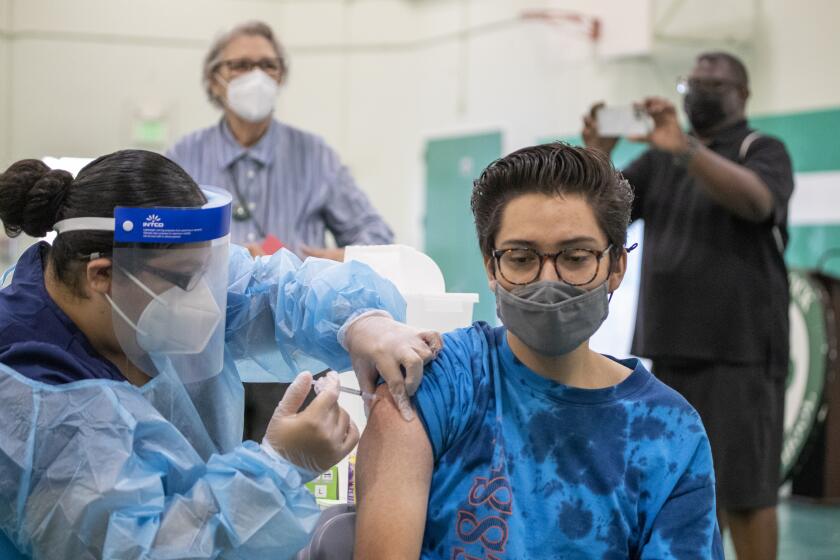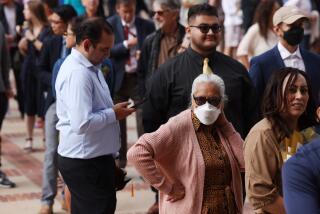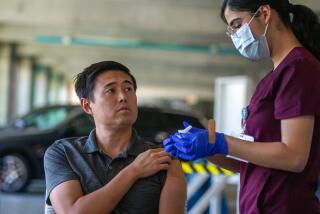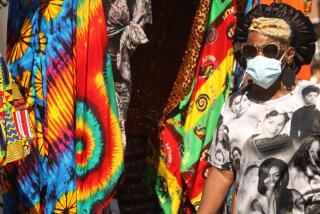Child coronavirus cases fall in L.A. County even as schools reopen, but concerns remain
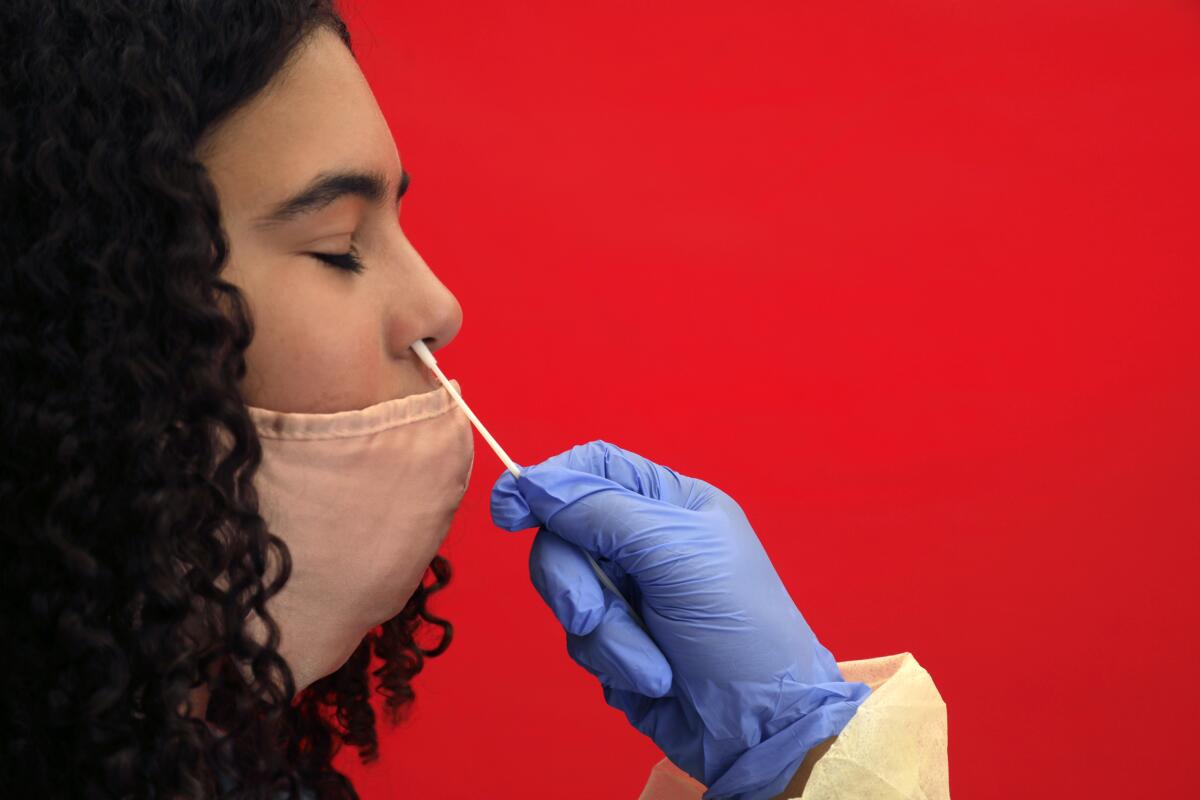
- Share via
Coronavirus case rates for children of all ages are declining in Los Angeles County — a trend that comes even as hundreds of thousands of youngsters return to school.
However, health officials note that children now comprise a greater share of people who are getting infected. Last week in the nation’s most populous county, children made up 27% of all newly confirmed infections — in keeping with the national trend. That finding underscores the continued risk of transmission among a sizable and largely unvaccinated segment of the population.
“We are hopeful that, with close attention to strategies that reduce the risk of exposure both at schools and in the community, we can continue to see lower case rates across all age groups,” L.A. County Public Health Director Barbara Ferrer told reporters Thursday.
She emphasized, however, that the recent declines are no reason to let up on efforts to boost vaccination rates — such as a sweeping measure taken by the L.A. Unified School District on Thursday to require all children 12 and older to be fully inoculated against COVID-19 by January in order to attend school — the first such vaccine mandate among the nation’s largest school systems.
With the order that students 12 and older must be fully vaccinated by January, L.A. Unified is at the forefront of strict COVID-19 safety measures. But pushback is likely.
“When we say that 55% of 12-to-15-year-olds are vaccinated, that means a whole bunch of them are not. And that creates a lot of really unnecessary risk. This is a vaccine-preventable disease at this point,” Ferrer said. “Communities that have super-high rates of transmission are all places that have lower rates of vaccination.”
Data recently obtained by the Los Angeles Times show only about a third of Black adolescents age 12 to 15 have received at least one COVID-19 vaccine dose in L.A. County, as have fewer than half of Latinos in the same age group.
By comparison, about 60% of white children in the age group have received at least one shot, as have about 85% of Asian American youths.
The reopening of K-12 and college campuses occurred at a precarious time of the pandemic: California and the rest of the nation were firmly in the grip of a fourth COVID-19 wave.
Among children, coronavirus cases in Los Angeles County increased between mid-July and mid-August.
But over the last two weeks, new weekly coronavirus cases have declined in children by about 30%, matching the decrease in cases seen among adults. Notably, the decreases have occurred even as L.A. Unified, the nation’s second-largest school district, reopened for the academic year Aug. 16.
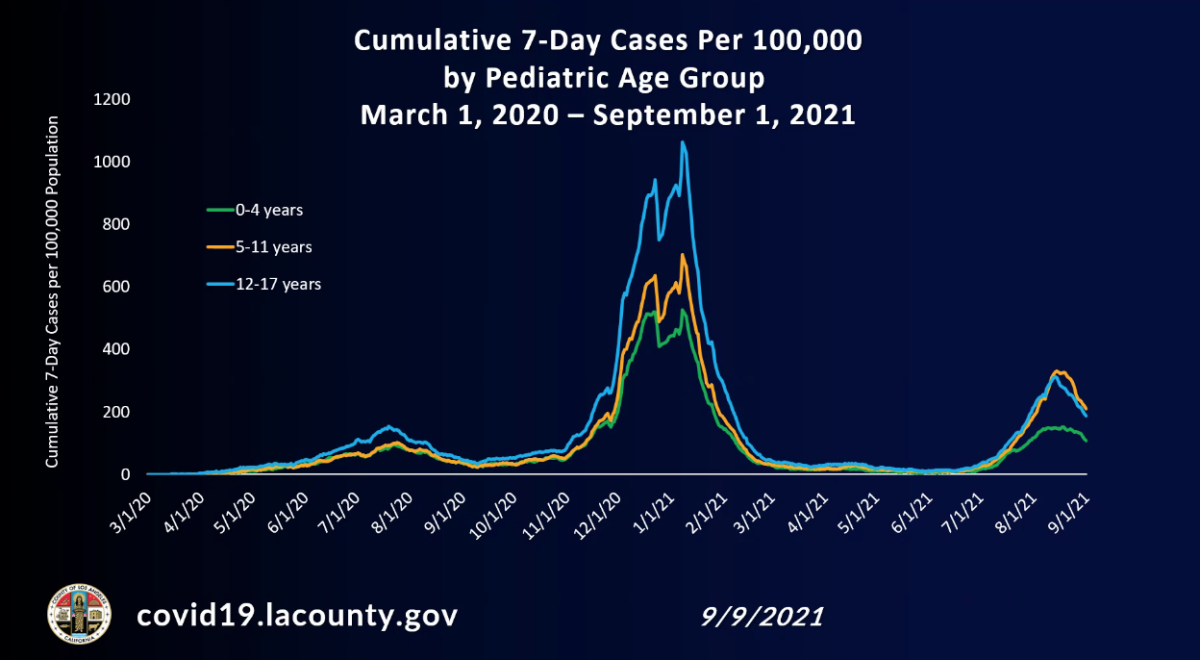
“These declines occurred as many schools reopened, with testing, masking, infection control and outbreak management protocols firmly in place,” Ferrer said.
Even as the number of weekly coronavirus cases among kids is starting to come down nationally, children make up an increasing percentage of people who are newly infected.
Since the pandemic began 18 months ago, cumulatively, children have comprised 15% of coronavirus cases, according to an analysis by the American Academy of Pediatrics and the Children’s Hospital Assn. But for the week that ended Sept. 2, 27% of weekly coronavirus cases nationally were among children — the same percentage as recently reflected in L.A. County.
San Francisco has a much lower percentage, most recently reporting that just 11.5% of recent coronavirus cases were among children.
The differences between L.A. County and San Francisco probably have to do with differing vaccination rates. Among children age 12 to 15 in L.A. County, 62% have received at least one dose, while 51% are fully vaccinated; among teens age 16 to 17, 69% have received at least one dose, while 59% are fully vaccinated.
In San Francisco, 90% of children age 12 to 17 are fully vaccinated.
Public schools in Los Angeles and San Francisco opened the same week, but in San Francisco, no coronavirus outbreaks have been verified.
Los Angeles County has identified 23 outbreaks in K-12 settings since Aug. 1, which include venues at schools, day camps and youth sports. An outbreak is defined by linked cases involving three or more people in which transmission probably occurred at schools or during school activities.
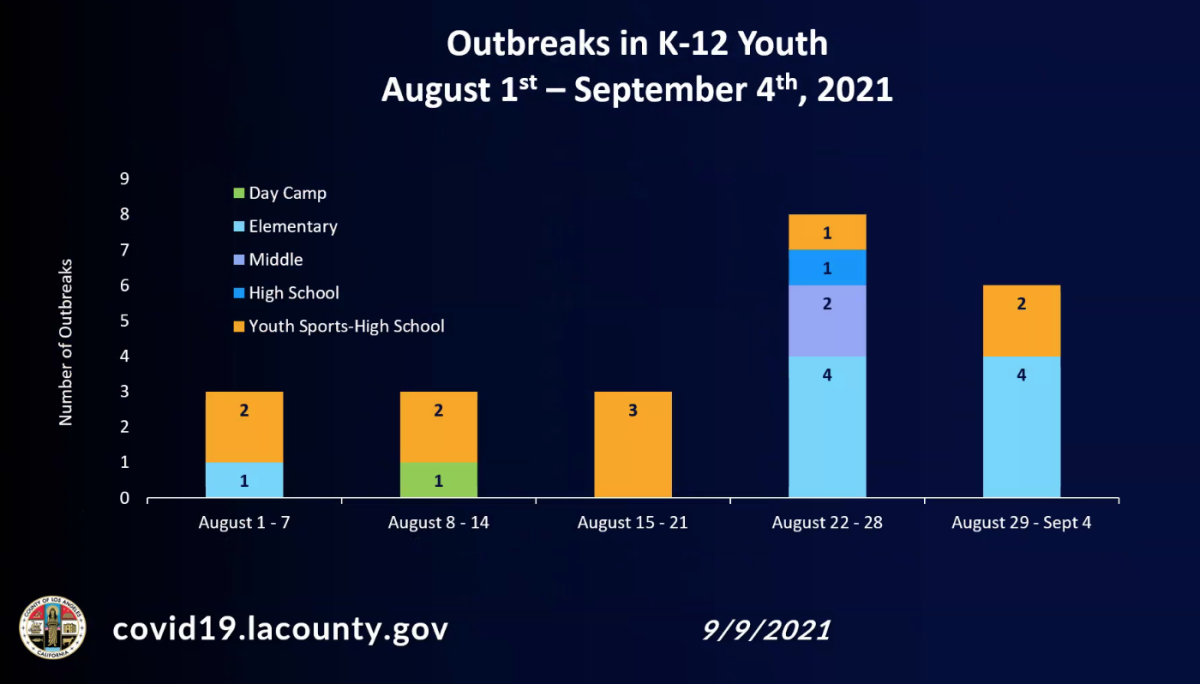
There were three outbreaks recorded the week of Aug. 16; eight the week after; and six outbreaks last week.
Fewer students in L.A. County were infected in last week’s outbreaks. Last week, 55 students were infected; the week before, 78 were infected. There were also fewer individuals exposed to infected people.
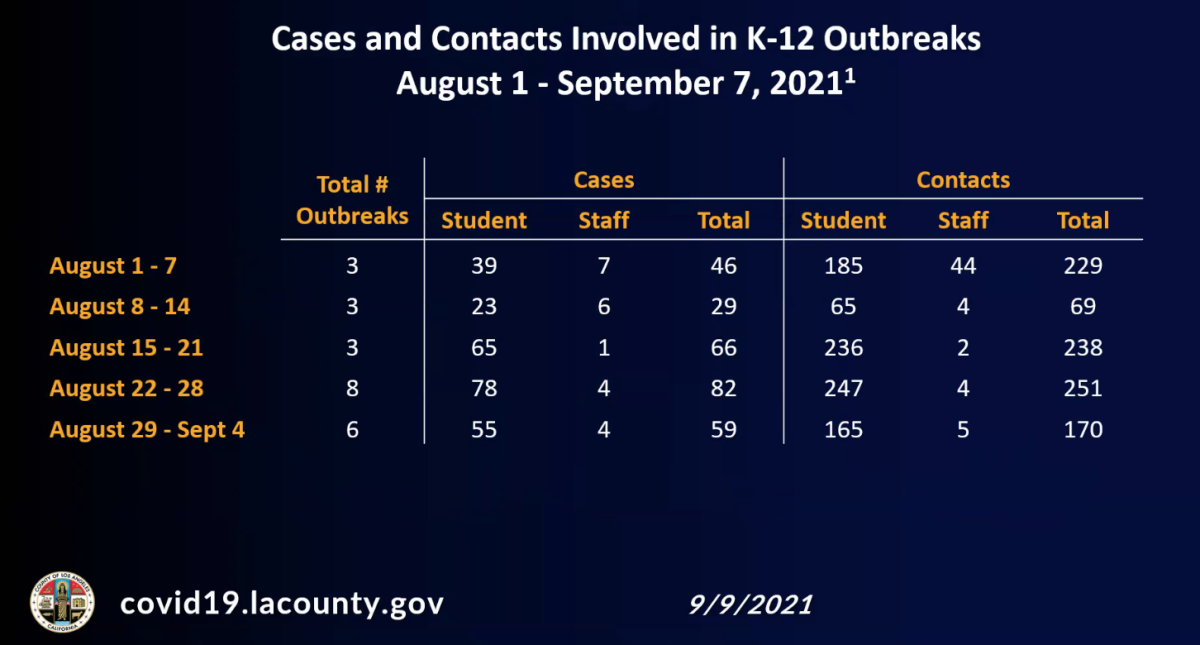
“This most likely reflects continued improvement in the process of determining who is exposed, and also reflects the excellent work that’s happening in schools across the county to reduce exposures and unnecessary quarantining of students,” Ferrer said.
While youth sports have remained a persistent source of school-related outbreaks, most outbreaks are now taking place in elementary schools, Ferrer said.
“While the small number of confirmed outbreaks is, as you can see, very low, given that we have over 3,000 school buildings open — and this is a positive sign that mitigation efforts may be very effective at reducing transmission in the school setting — we do anticipate an upward trend in outbreaks as more schools are open,” Ferrer said.
Ferrer and other health experts welcomed LAUSD’s move to require vaccinations among its eligible students, calling the move sensible.
“This policy of requiring vaccination for everyone that is eligible for it is going to be critical in terms of reducing the potential for spread of the virus,” said UCLA epidemiology professor Anne Rimoin. It’s all the more important, Rimoin said, because the dominating Delta variant circulating is “so much more contagious than the original variant.”
Despite the promising trends overall, Ferrer said it’s not assured that cases will continue to decline. Countywide, 1.5 million children are returning to schools, as are almost 200,000 staff and teachers supporting them, and more than 100,000 college students are returning to campuses.
“There’s great opportunities for there to be more spread,” Ferrer said, adding that the ultra-contagious Delta variant is still dominant and that it’s likely there will be some kind of increase in cases associated with Labor Day.
“The hope is that we have more people vaccinated now than we ever have had before, and that blunts the increases,” Ferrer said.
Pediatric COVID-19 hospitalizations remain relatively low in Los Angeles County, although they are increasingly slightly among school-age children. They are higher than they were in the spring, but remain only a fraction of the rate recorded during the winter.
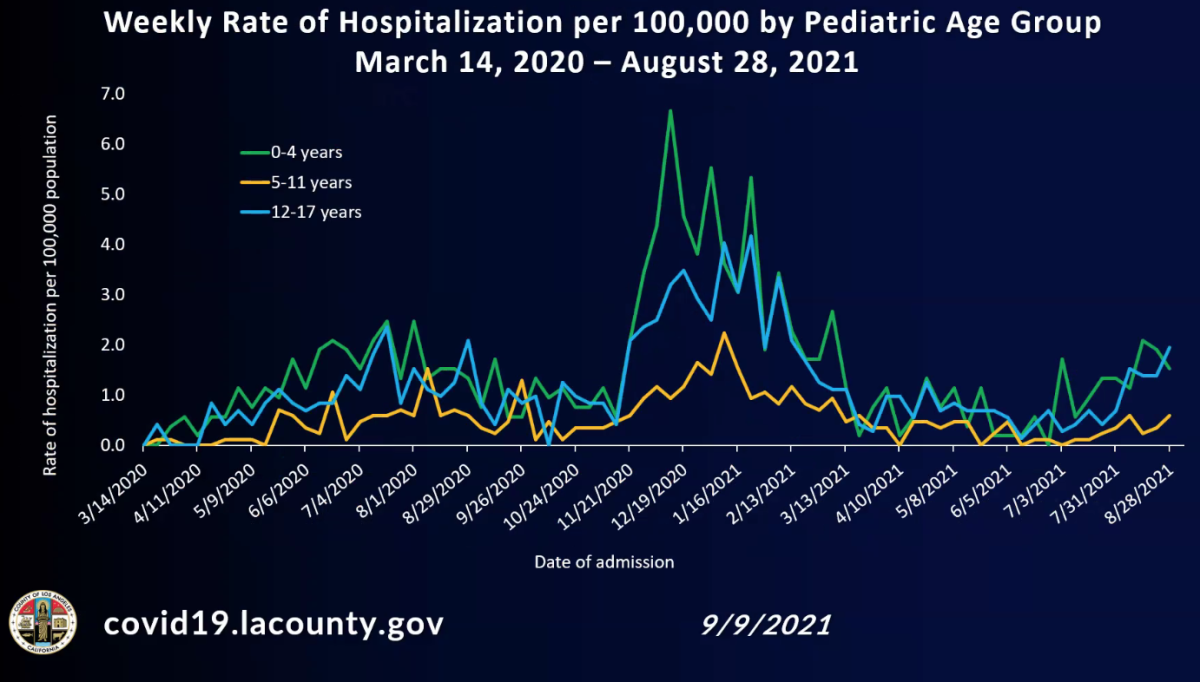
Ferrer said it’s possible those figures could still rise with schools back in session.
“There is the possibility of many more exposures. And, since hospitalizations can be a lagging indicator, we’ll be carefully watching hospitalization rates among children over the upcoming weeks,” she said.
The trends in L.A. County and California as a whole are vastly different than in other states, such as Texas and Florida, where pediatric hospitalization rates are the highest they’ve ever been since the start of the pandemic. The governors of Texas and Florida have opposed mask mandates in schoolchildren, while California has required masks to be worn by students indoors.
Overall, COVID-19 death rates among children continue to be much lower than among adults in Los Angeles County. Since the beginning of the pandemic, seven children infected with the coronavirus have died in the county.
L.A. County continues to see promising signs of overall progress in its battle against the coronavirus’ latest charge.
Over the last week, the county has reported an average of 1,972 new cases per day — down 33% from two weeks ago, according to data compiled by The Times.
COVID-19 hospitalizations, too, have been steadily decreasing. On Wednesday, 1,368 coronavirus-positive patients were hospitalized countywide, a nearly 24% drop since mid-August.
Deaths also appear to have leveled off somewhat — although at a troubling level. Over the past week, an average of 27 Angelenos have died from COVID-19 per day.
Times staff writer Howard Blume contributed to this report.
More to Read
Sign up for Essential California
The most important California stories and recommendations in your inbox every morning.
You may occasionally receive promotional content from the Los Angeles Times.
